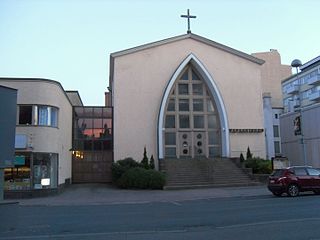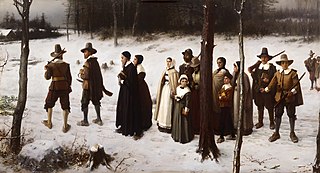The Evangelical Church may refer to:
Pietism, also known as Pietistic Lutheranism, is a movement within Lutheranism that combines its emphasis on biblical doctrine with an emphasis on individual piety and living a holy Christian life.
The Evangelical Lutheran Church in America (ELCA) is a mainline Protestant church headquartered in Chicago, Illinois. The ELCA was officially formed on January 1, 1988, by the merging of three Lutheran church bodies. As of December 31, 2023, it has approximately 2.79 million baptized members in 8,498 congregations.
The Confessing Movement is a largely lay-led theologically conservative Christian movement that opposes the influence of theological liberalism and theological progressivism currently within several mainline Protestant denominations and seeks to return those denominations to its view of orthodox doctrine or to form new denominations and disfellowship (excommunicate) them if the situation becomes untenable. Those who eventually deem dealing with theological liberalism and theological progressivism within their churches and denominations as not being tenable anymore would later join or start Confessional Churches and/or Evangelical Churches that continue with the traditions of their respective denominations and maintaining orthodox doctrine while being ecclesiastically separate from the Mainline Protestant denominations. Youth aligned with the Confessing Movement have viewed their project as being an 'Operation Reconquista'.

Open communion is the practice of some Protestant Churches of allowing members and non-members to receive the Eucharist. Many but not all churches that practice open communion require that the person receiving communion be a baptized Christian, and other requirements may apply as well. In Methodism, open communion is referred to as the open table, meaning that all may approach the Communion table.

The mainline Protestant churches are a group of Protestant denominations in the United States and Canada largely of the theologically liberal or theologically progressive persuasion that contrast in history and practice with the largely theologically conservative evangelical, fundamentalist, charismatic, confessional, Confessing Movement, historically Black church, and Global South Protestant denominations and congregations. Some make a distinction between "mainline" and "oldline", with the former referring only to denominational ties and the latter referring to church lineage, prestige and influence. However, this distinction has largely been lost to history and the terms are now nearly synonymous.

A united church, also called a uniting church, is a denomination formed from the merger or other form of church union of two or more different Protestant Christian denominations, a number of which come from separate and distinct denominational orientations or traditions. Multi-denominationalism, or a multi-denominational church or organization, is a congregation or organization that is affiliated with two or more Christian denominations, whether they be part of the same tradition or from separate and distinct traditions.

A free church is any Christian denomination that is intrinsically separate from government. A free church neither defines government policy, nor accept church theology or policy definitions from the government. A free church also does not seek or receive government endorsements or funding to carry out its work. The term is only relevant in countries with established state churches. Notwithstanding that the description "free" has no inherent doctrinal or polity overtones. An individual belonging to a free church is known as a free churchperson or, historically, free churchman. In Scandinavia, free churchpersons would include Protestant Christians who are not communicants of the majority national church, such as the Lutheran Church of Sweden. In England, where the Church of England was the established church, other Protestant denominations such as Presbyterians, Congregationalists, Baptists, the Plymouth Brethren, Methodists and Quakers are, accordingly, free churches. In Scotland it might be used regarding any Protestant denomination, including the Free Church of Scotland, the Free Presbyterian Church of Scotland, the Reformed Presbyterian Church of Scotland etc, in distinction to the established Church of Scotland.

The Evangelical and Reformed Church (E&R) was a Protestant Christian denomination in the United States. It was formed in 1934 by the merger of the Reformed Church in the United States (RCUS) with the Evangelical Synod of North America (ESNA). A minority within the RCUS remained out of the merger in order to continue the name Reformed Church in the United States. In 1957, the Evangelical and Reformed Church merged with the majority of the Congregational Christian Churches (CC) to form the United Church of Christ (UCC).
The Federal Council of Churches, officially the Federal Council of Churches of Christ in America, was an ecumenical association of Christian denominations in the United States in the early twentieth century. It represented the Anglican, Baptist, Eastern Orthodox, Lutheran, Methodist, Moravian, Oriental Orthodox, Polish National Catholic, Presbyterian, and Reformed traditions of Christianity. It merged with other ecumenical bodies in 1950 to form the present day National Council of Churches.

Lutheranism is present on all inhabited continents with an estimated 80 million adherents, out of which 74.2 million are affiliated with the Lutheran World Federation. A major movement that first began the Reformation, it constitutes one of the largest Protestant branches claiming around 80 million out of 920 million Protestants. The Lutheran World Federation brings together the vast majority of Lutherans. Apart from it, there are also other organisations such as the International Lutheran Council and the Confessional Evangelical Lutheran Conference, as well as multiple independent Lutheran denominations.
Protestants in India are a minority and a sub-section of Christians in India and also to a certain extent the Christians in Pakistan before the Partition of India, that adhere to some or all of the doctrines of Protestantism. Protestants in India are a small minority in a predominantly Hindu majority country, but form majorities in the north-eastern states of Meghalaya, Mizoram and Nagaland. They are also significant minorities in Punjab region, Konkan region, Bengal, Kerala and Tamil Nadu, with various communities in east coast and northern states. Protestants can trace their origins back to the Protestant Revolution of the 16th century. There are an estimated 20 million Protestants and 16 million Pentecostals in India.

The Communion of Protestant Churches in Europe is a fellowship of over 100 Protestant churches which have signed the Leuenberg Agreement. Together they strive for realizing church communion, especially by cooperation in witness and service to the world. Prior to 2003 the CPCE was known as the "Leuenberg Church Fellowship".

In Christianity, the ordination of women has been taking place in an increasing number of Protestant and Old Catholic churches, starting in the 20th century. Since ancient times, certain churches of the Orthodox tradition, such as the Coptic Orthodox Church, have raised women to the office of deaconess. While ordination of women has been approved in many denominations, it is a very controversial and divisive topic.

Protestantism is the largest grouping of Christians in the United States, with its combined denominations collectively comprising about 43% of the country's population in 2019. Other estimates suggest that 48.5% of the U.S. population is Protestant. Simultaneously, this corresponds to around 20% of the world's total Protestant population. The U.S. contains the largest Protestant population of any country in the world. Baptists comprise about one-third of American Protestants. The Southern Baptist Convention is the largest single Protestant denomination in the U.S., comprising one-tenth of American Protestants. Twelve of the original Thirteen Colonies were Protestant, with only Maryland having a sizable Catholic population due to Lord Baltimore's religious tolerance.
Brethren is a name adopted by a wide range of mainly Christian religious groups throughout history. The largest movement is Anabaptist.
Altar and pulpit fellowship describes an ecumenical collaboration between two Christian organizations, and is a Lutheran term for full communion, or communio in sacris.Altar refers to the altar in Christian churches, which holds the sacrament of Holy Communion. Pulpit refers to the pulpit, from which a pastor preaches. Altar and pulpit fellowship is therefore a specific understanding of "doctrinal agreement and confessional unity" that "allows the pastors of one church to preach and celebrate Holy Communion in the church of another".